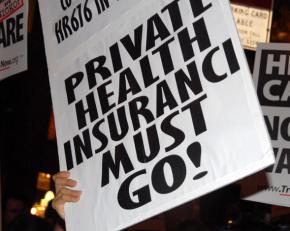Speaking up for single-payer in Chicago
By
CHICAGO--Reform advocates, health care workers and professionals, and unionists turned out June 7 for the first public hearing for proposed legislation to create a single-payer health care system.
State Rep. Mary Flowers is sponsoring a bill named the "Health Care for All Illinois Act" (HB 311), sponsored by state Rep. Mary Flowers, would eliminate the private health insurance industry and replace it with a statewide single-payer system to provide health coverage to everyone.
The hearing was held on Chicago's South Side. Over forty people attended, and everyone who testified spoke in favor of HB 311.
The hearing began with Dr. Quentin Young, the volunteer national coordinator of Physicians for a National Health Program (PNHP), who outlined the depth of the crisis in Illinois. There are 1.8 million people without health insurance in the state, he said, and 900,000 live in Cook County alone. Young said two people die on an average day because they have no health insurance, and another four to 10 die because of inadequate coverage.
A range of other people gave testimony: nurses, social workers, doctors, a disability rights activist, a professor from DePaul University, an AFSCME member and many patients with harrowing health care horror stories.
Steve Edwards of AFSCME Local 2858 talked about the latest contract offer from his employer, the state of Illinois. State officials want workers to pay a percentage of their insurance premium, instead of a defined amount. Another contract proposal is for retirees to pay up to 50 percent of their premiums, which is virtually impossible because retired workers are on fixed incomes.
Brenda Langford, a registered nurse at Stroger Hospital in Chicago and a member of the board of directors of the California Nurses Association/National Nurses Organizing Committee, reported, "There are excessive delays in care, federal support for public health has declined, and the hospital is operating on the brink."
Another nurse who works in the ER at Stroger said she has less time to explain things to patients, which leads to confusion and readmissions. She said one family brought their child in three times because they thought she had a brain tumor and was going to die. They didn't speak English, and no one clearly explained that their daughter had a seizure disorder.
One of the most compelling speakers was Jody Polka, who spoke on behalf of her father, Cyril Strezo, who died of esophageal cancer. His insurer, UniCare, denied him the aggressive chemotherapy his oncologist recommended, saying it was "experimental." But the treatment wasn't experimental and had been approved by the FDA in 1996.
When the cancer spread to his liver and brain, Cyril began to receive hospice care at home. After a few months, Unicare called the family to say Cyril was no longer eligible for hospice services. Mr. Strezo paid $2,400 a month to Unicare for his premium. Choking back tears, Jody said, "My dad's fight lives on, in me and you."
Vanessa Beck discussed how obtaining health care and medicine has dictated the course of her life. She has Crohn's disease and has fought with insurers for treatment, lost jobs and housing, and had to declare bankruptcy. "It disgusts me that my values are not represented by this state's health care policies," she said.
This was a historic first hearing for single-payer in Illinois, and there are three more planned for other counties. The struggle to pass this legislation has just begun, but it got off to a strong start.



